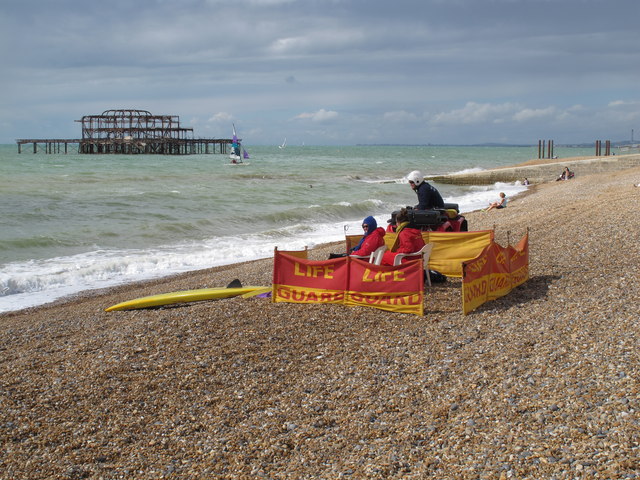The number of lifeguard stations will be cut along Brighton and Hove seafront this summer despite an attempt by Labour to block the change.
The Greens and Conservatives agreed to the reduced service after funding was cut by £100,000 when Brighton and Hove City Council set its 2023-24 budget last month.
Labour councillors said that £60,000 had been reallocated to fund lifeguards and other tourism services at the “budget council” meeting from money set aside for “diseased tree removal”.
But councillors were told that about half the money – or £30,000 – would be used to provide safety information on beaches rather than on restoring the lifeguard service. The rest would go towards the Visit Brighton tourism service and Volk’s Railway.
The proposed cuts to the lifeguard service led to a heated debate at the council’s Tourism, Equalities, Communities and Culture Committee meeting at Hove Town Hall last night (Thursday 9 March).
The reduced service means that from late May to September lifeguards would cover the four busiest beaches in Brighton and Hove, down from seven in previous years.
And during the six-week school summer holidays, the next three busiest beaches would also have a lifeguard service. Ten beaches were covered during the school summer holidays last year.
Labour councillor Amanda Evans urged the council to use the £30,000 that was being budgeted for safety information for lifeguards instead.
Councillor Evans said that the council should provide “at least some additional services, ideally on all 10 beaches previously covered, even if restricted to peak hours, for example”.
She said: “This is motivated … purely by concerns about public safety which I’m sure we all share. How will we feel if someone drowns in the middle of the afternoon on an unguarded beach that was previously covered?”
Fellow Labour councillor Alan Robins said: “I don’t want to be trying to handle the communications or anything else when someone has got into trouble on a beach where we’ve taken away the lifeguards.
“It’s not only the immediate danger that people are in – in the sea. It’s the advice and the untold lives that could be saved by people saying, ‘don’t go in there now. It’s too rough.’ (That’s) advice which won’t be given because there isn’t anyone there.”
Green councillor Martin Osborne, who chaired the meeting, said that the £30,000 would go towards signs and information on those beaches without lifeguards.
Councillor Osborne said: “I said it was a silly amendment at (budget) council and I tried to explain that the specific amounts of money needed to be clarified. Now we are in this difficult situation where officers have to try to match up the service.”
Green councillor Leo Littman said that the lifeguard service, including the reduced service this year, took a “risk-based” approach.
A report to the committee said that 750,000 people a year visited the beach – and the four busiest would have lifeguards all summer.
Councillor Littman said: “Our Labour colleagues voted for the budget, which sadly had reduced funding to the lifeguard service of £100,000 a year as part of a package of cuts to services forced on us by the Tory government’s failed austerity programme.
“Labour are claiming to have saved the lifeguard service, which let’s not forget was never under threat of closure, by adding an unidentified portion of a one-off £60,000.
“It would be a bit like claiming to have saved your local post office by putting a stamp on a letter and posting it. It would be a nonsense.”
Conservative councillor Samer Bagaeen asked for visitor numbers for the various beaches and questioned how lifeguards were allocated.
He was told that the lifeguards were stationed using data from previous years including the volume of beachgoers, the location of incidents and the number of hazards on the beaches.
The five Green councillors on the committee voted against Labour’s proposal. Councillor Bagaeen abstained. He then voted with the Greens to approve the reduced lifeguard cover for this year.
A longer-term approach is being drawn up – to be discussed at a future meeting. It is expected to include the prospect of the Royal National Lifeboat Institution (RNLI) taking over the service.










It’s alarming they’d rather spend £30,000 on yet more plastic signs than to employ staff who might actually save lives.
The seafront already has a huge clutter of signs – that most people seem to ignore, LOL.
A lack of lifeguards will increase pressure on the ambulance service. A sign cannot resuscitate a drowned child.
I know- let’s have more parking spaces on the seafront and fund the lifeguards from that…